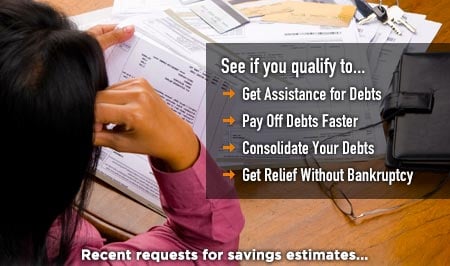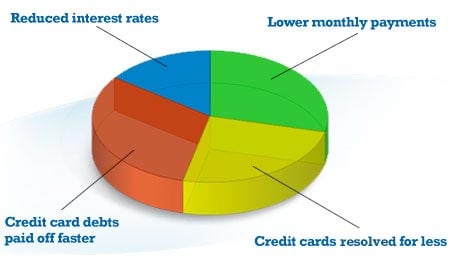
Will Debt Consolidation Without a Loan Help You?
Are you interested in getting relief from your debts, including credit card debts and other types of unsecured debts (such as medical bills, department store charges, or even utilities) and wondering if debt consolidation loans are the answer? Then you may be interested in finding out about the potential savings that may end up in your pocket through debt consolidation through credit counseling.
These days, many residents in Florida get relief and reduce debts through any number of debt relief options, including a debt consolidation program coordinated by a credit counseling agency, debt settlement, or debt consolidation loans. These debt relief methods have become popular alternatives to bankruptcy - which has a more damaging and longer lasting impact to personal credit. To find out which debt relief option may be right for you, answer a few, simple questions to get a free debt relief analysis and savings estimate.
Debt Consolidation Benefits
The term "debt consolidation" has come to represent a wide variety of debt relief options in the industry. But what it actually refers to is the process of combining, or "consolidating," credit card and unsecured debts into one, more affordable, and more manageable monthly payment made to a credit counseling agency that, in turn, distributes funds to creditors. Many consumers also refer to debt consolidation as a debt management plan, or DMP.
When you enroll in a debt consolidation program, you will speak to credit counselors who will review your outstanding debts, and review how much money you can reasonably dedicate each month to paying down your debts. Once they have a good understanding of your finances, credit counselors typically develop a strategy to help reduce your debts by submitting proposals (on your behalf) to creditors asking for reduced interest rates, or the waiving or elimination of any late fees or penalties. Creditors that agree to the proposals are placed into the debt management plan.
The goal of debt consolidation is, with a single, more structured, and more affordable payment plan, you can ideally direct more of your payment towards paying off the principal of your loans rather than just the interest - and eventually, reduce your debts sooner than if you continued making the monthly payments on your credit card debts at higher interest rates. If you are interested in finding out how much you can save every month through debt consolidation, request a free debt relief analysis and savings estimate - at no obligation.
What Is a Debt Consolidation Loan?
Many consumers make the mistake of thinking that debt consolidation is the same as taking out a debt consolidation loan, so it is wise to understand their fundamental difference. As noted earlier, debt consolidation involves combining your unsecured and credit card debts into a single, more affordable payment plan made to a credit counseling agency. In contrast, with debt consolidation loans, you are generally combining your high-interest debts into one, lower interest loan.
A debt consolidation loan involves taking unsecured debt and paying it off with funds that come by way of a "secured" loan. In other words, it's a loan where you would have had put up your home or other asset to get approved. In many cases, consumers who get approved for a debt consolidation loan generally ring up new credit card charges. As a result, many of them will have new, high-interest credit card debts to deal with on top of their loan. Under this scenario, a debt consolidation loan has generally made their debt situation go from bad to worse. When you consider some of the hidden pitfalls that may occur when taking out a debt consolidation loan, it is wise to explore your other debt relief options - like debt consolidation - that not only helps you reduce your debts, but can also give you solid information about how to better manage your budget.
How Much Can You Save With Debt Consolidation?
Each individual's debt situation is unique, as are the reasons for getting into debt in the first place. For some, the reasons vary from having lost or reduced income, rising medical expenses, or an unexpected personal crisis. But regardless of the reasons why you are falling months behind on your payments, debt consolidation may be able to help manage your debts and potentially lead to savings.
However, the amount of savings that you can potentially get, every month, depends on how much you owe, the current interest rates that you are paying, and any late fees or penalties you have. With a debt consolidation program, you will be provided with a more structured and more lenient repayment plan that can help you pay off your debts sooner than if you only continued to make the minimum monthly payments and at a pace that you can manage.
That's why it is a smart move to find out how debt consolidation can help you get back on track with your finances as well as help you reduce your debts. Request a free debt relief analysis and savings estimate - now to get you started.





















